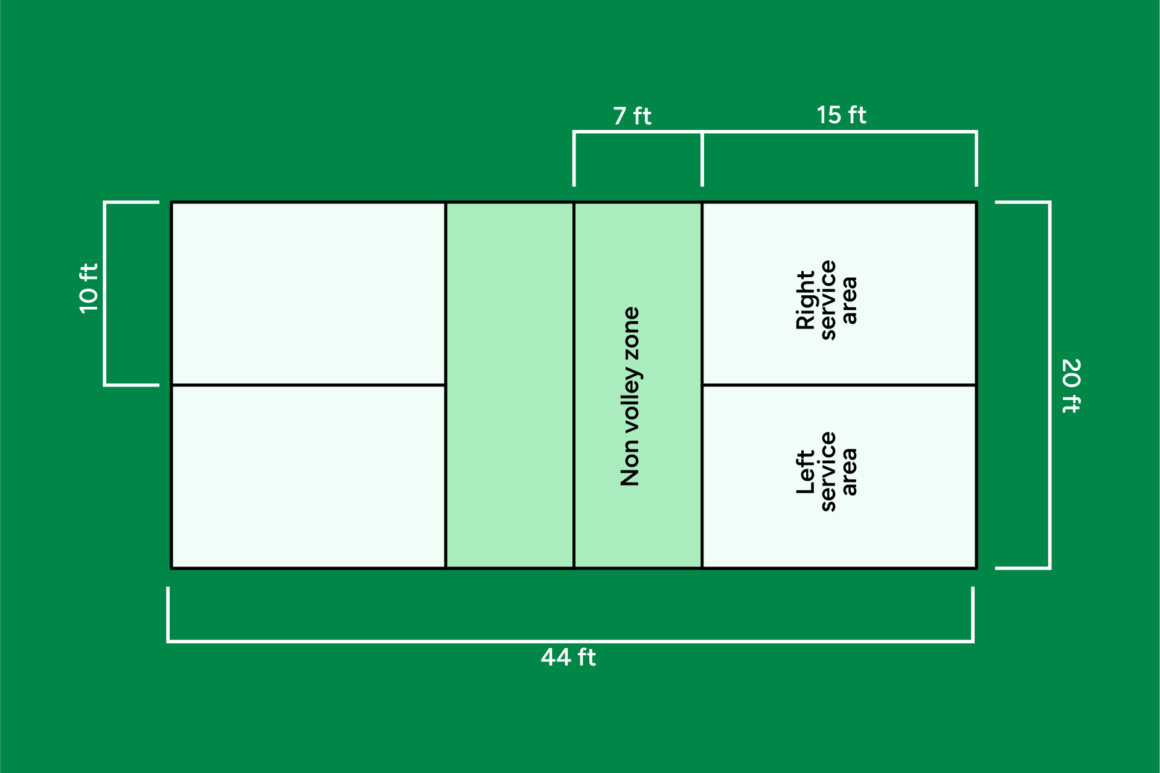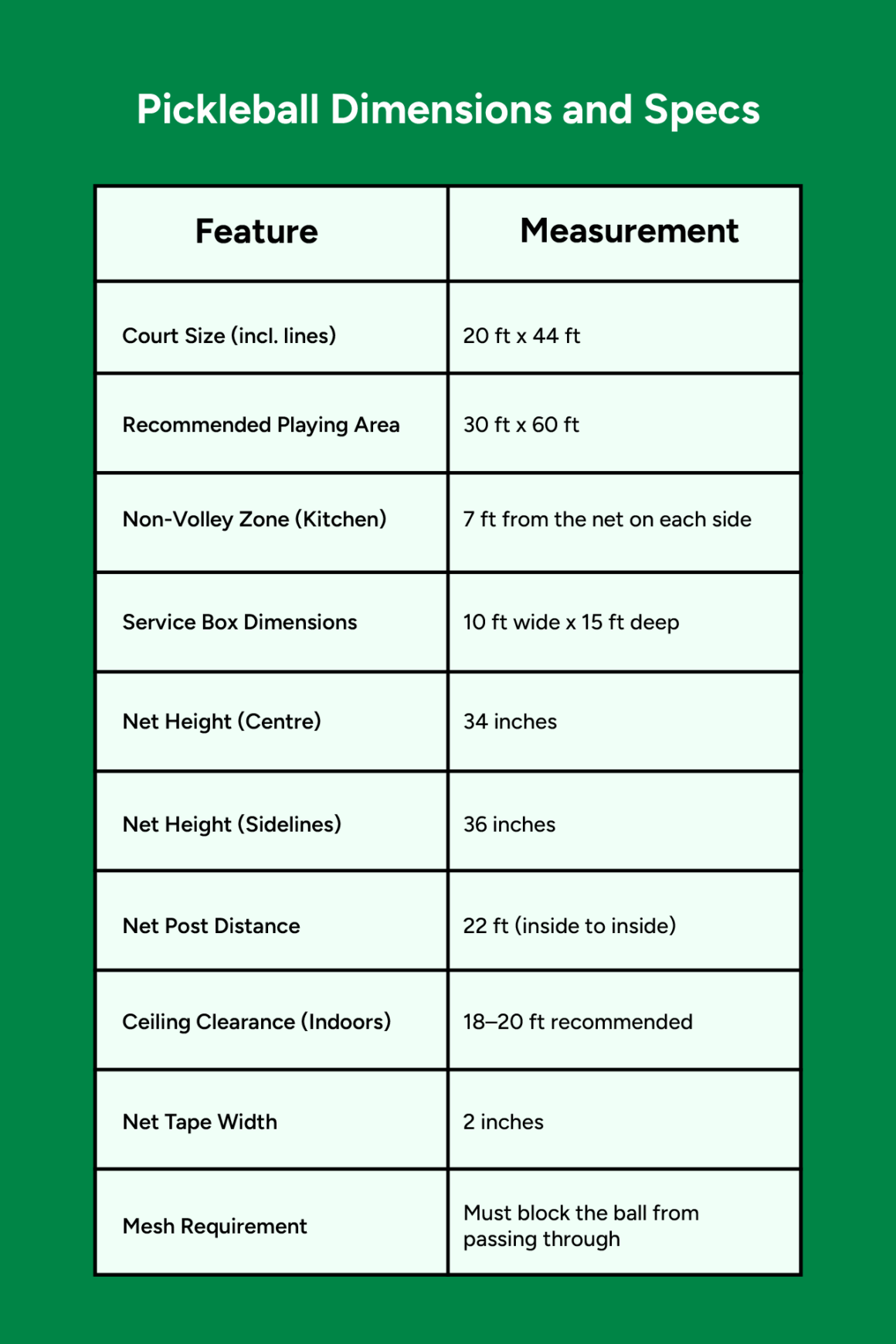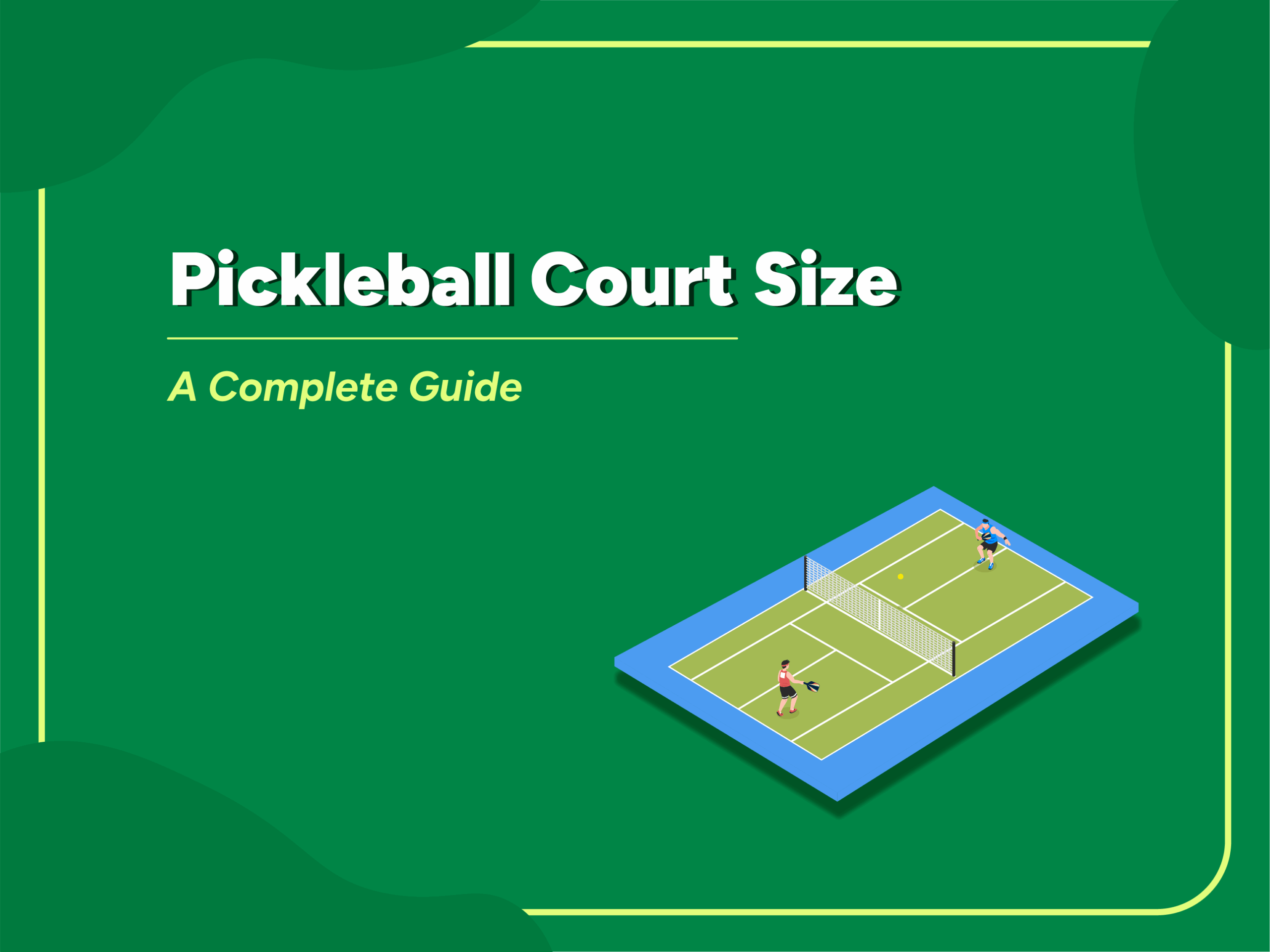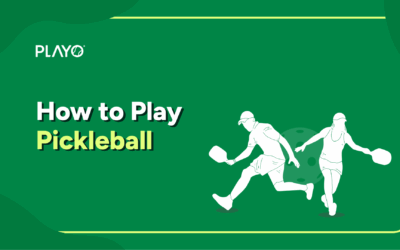Pickleball might be fun and fast-paced, but the court it’s played on? That’s where the game really begins.
If you’ve recently picked up a paddle (or are thinking about it), understanding the court layout can give you a real edge. After all, knowing where to stand and where not to is half the battle.
In this guide, we’re unpacking the essentials: pickleball court size, layout, surface types, and net height. Whether you’re considering building a court, joining your local league, or just want to brush up before your next game, this is the place to start.
What’s the Standard Pickleball Court Size?
Let’s get right to the point—the standard pickleball court size is 20 feet wide by 44 feet long, including the boundary lines. That’s the official size, whether you’re playing singles or doubles.
To put that in perspective, a pickleball court is:
- Smaller than a tennis court (about one-third the size)
- Slightly bigger than a badminton court
The compact nature of the court is one of the reasons pickleball is so accessible. It’s easier on the knees, and you don’t need to sprint much to get to the ball.
New to the sport? Here’s a great place to start: What is Pickleball?
Understanding Pickleball Court Dimensions

Let’s zoom in on the official pickleball court dimensions:
- Total Playing Area: 20 ft x 44 ft (measured to the outside edges of the lines)
- Non-Volley Zone (“The Kitchen”): Extends 7 feet from the net on both sides
- Service Areas: Each side is divided into two service zones (left and right), each measuring 10 feet wide by 15 feet deep
- Centerline: Runs from the kitchen line to the baseline, dividing the service boxes
- Line Width: All lines are 2 inches wide and included in the court’s dimensions
For a comfortable play experience, especially for competitive matches, the recommended overall playing area is 30 feet wide by 60 feet long to allow room for movement around the court.
Pickleball Court Measurements for Indoors vs. Outdoors
Whether you’re building a court in your backyard or setting up an indoor facility, the pickleball court measurements remain the same. But there are some differences in setup and surface:
Indoor Courts
- No wind interference
- Lighting and ventilation are important
- Often use cushioned, modular flooring
- Recommended ceiling clearance is 18 to 20 feet to accommodate lob and overhead shots
Outdoor Courts
- Must account for drainage, heat, and weather
- Typically made from concrete or asphalt
- Permanent net posts are more common and are placed 12 inches outside the sidelines, making the total distance between post centres 22 feet
Pickleball Court Flooring: What’s Under Your Feet Matters
When it comes to pickleball court flooring, comfort and durability are key. The surface you play on affects everything from ball bounce to joint impact. Here are the common options:
1. Asphalt or Concrete
- Most popular for outdoor courts
- Budget-friendly and durable
- It can be tough on the knees without extra cushioning
2. Modular Tiles
- Great for indoor and multi-use facilities
- Provide shock absorption
- Easy to install and maintain
3. Cushioned Acrylic
- Offers excellent comfort and grip
- Preferred in professional settings
- Installed over concrete or asphalt
4. Wood Flooring
- Found in indoor gyms
- Smooth surface, but can be slippery if not maintained well
Choosing the right pickleball court material depends on your location, budget, and level of play. Even basic surfaces can work well for casual games.
What Material is Best for a Pickleball Court?
Your court surface makes a huge difference in how the game feels. Here’s what to consider:
- Backyard DIY Setup: Asphalt or concrete with acrylic paint
- Indoor Facilities: Modular tiles or cushioned vinyl flooring
- High-End Courts: Cushioned acrylic layered over concrete
And if you’re not ready to commit, portable pickleball surfaces and nets make great temporary solutions.
Pickleball Net Height: Don’t Forget the Details
You can’t play a proper game without the net—and yes, pickleball net height matters!
- 36 inches at the sidelines
- 34 inches at the centre
This slight sag in the middle creates just enough challenge to make you think twice before hitting high shots.
Official specs also say:
- The net must span the entire width of the court—22 feet from post to post
- Net posts should be placed 12 inches outside the sidelines
- The top edge of the net must be bound with 2-inch white tape
- The net’s mesh must be small enough to prevent the ball from passing through
So if you’re using a portable net, double-check these details for a regulation setup.
Curious how pickleball got its quirky name? Read: Why is it called Pickleball?
Can You Use a Tennis Court for Pickleball?
Absolutely. In fact, many public parks do exactly that by overlaying pickleball lines on tennis courts. Since tennis courts are much larger (60 ft x 120 ft), you can fit up to four pickleball courts in the same space.
It’s a great workaround for communities looking to offer both sports in a shared space.
Quick Recap: Pickleball Dimensions and Specs
Here’s a quick cheat sheet to keep things straight:

Final Thoughts
Pickleball may be easy to learn, but it’s got its own set of standards when it comes to court size, flooring, and equipment. Whether you’re setting up your own court or just want to know more about the game, understanding the pickleball court size and related dimensions can seriously improve your playing experience.
So next time you step on the court, you’ll know exactly where to stand—and why it matters.
Let the games begin!
If you’re just starting out, don’t miss this: Top 5 Best Pickleball Paddles for Beginners
Frequently Asked Questions:
1. What is the standard pickleball court size?
A pickleball court is 20 feet wide by 44 feet long, including lines. Both singles and doubles play on courts of this size.
2. What’s the best surface for a pickleball court?
Cushioned acrylic over concrete is perfect for performance and comfort. Asphalt and modular tiles are also excellent choices based on whether the court is outdoor or indoor.
3. Is a pickleball court the same size as a tennis or badminton court?
No. A pickleball court is smaller, approximately one-third the dimensions of a tennis court and somewhat bigger than a doubles badminton court.




